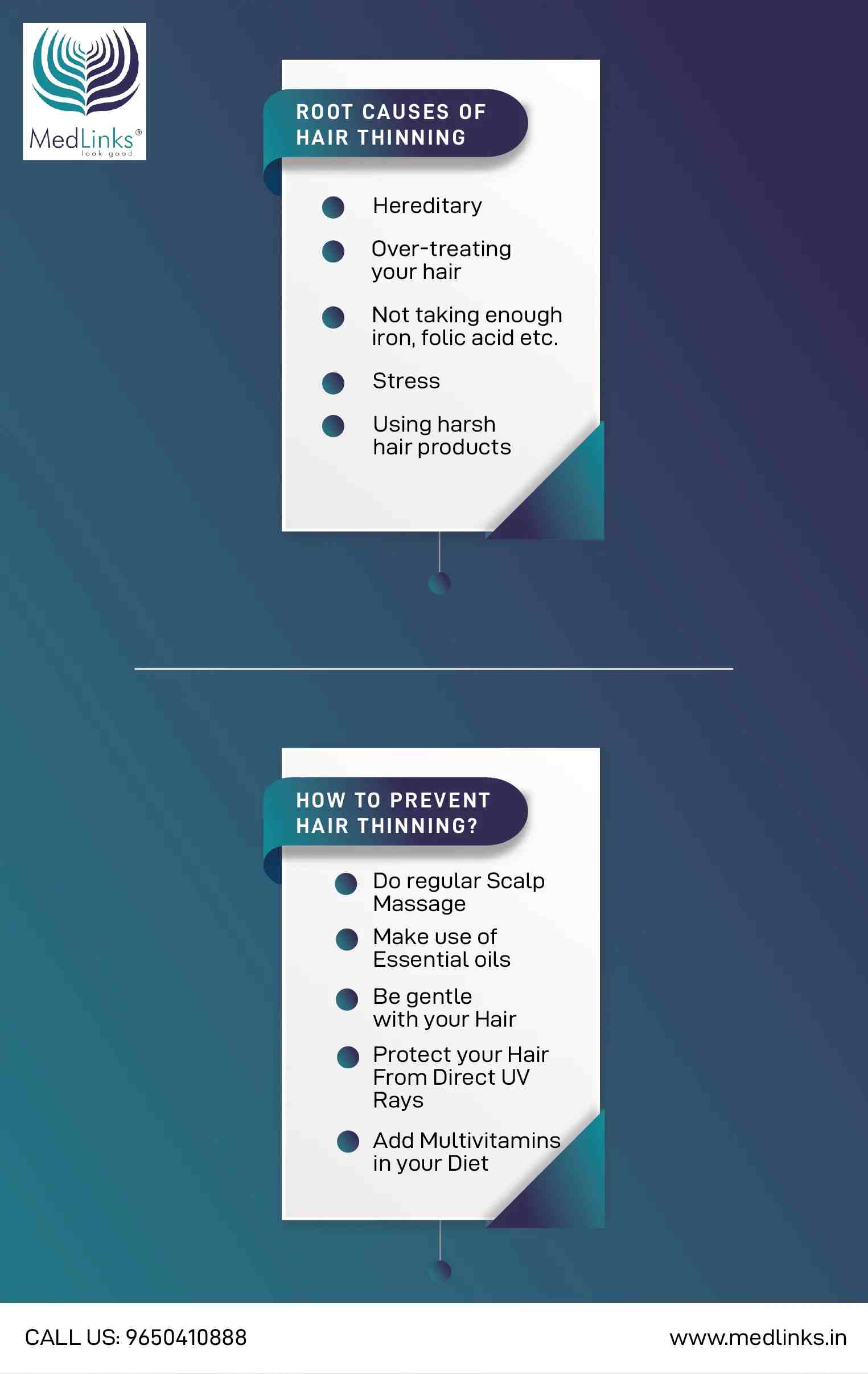- Home
- About Us
- Hair Transplant
- Hair Loss
- Medical Treatment
- Patients Gallery
- Our Patients
- Blog
- Contact Us
- Hair Transplant Cost
- Book an Appointment
- Brochure
5 out of 10 people across the globe struggle with hair loss in some form. Typically, hair thinning is considered as one of the most common forms of hair loss witnessed in both men and women. Not just with age, hair thinning is a very common issue that is linked with genetics, poor dietary habits, or even nutrient deficiency.
The causes of hair loss are predominant, and only a qualified and experienced specialist will be able to pinpoint the trigger that is making you lose them. So, if you start witnessing sudden hair loss and thinning, consulting a hair restorative specialist is your saving grace.
This article will discuss everything there is to know about your issues with thinning hair and the ways to rectify them.
Feel free to skip ahead if one topic catches your eye:
Hair thinning is a medical condition where the patient starts noticing a drastic reduction in the volume and thickness of the hair. Typically, it is witnessed with age, but the same can also progress due to genetic predisposition, poor eating habits, or an undiagnosed underlying condition like thyroid dysfunction.
If you are losing 50-100 strands of hair daily, don’t be alarmed because that is healthy shedding. However, the issue lies when the patient starts witnessing uncontrolled hair loss, especially across the scalp, and not localized to a specific region.
In case you are struggling with the same hereditary hair loss, seeing a doctor is ideal. As for diagnosis, your doctor will first look into the pattern of hair loss before asserting the cause and the aligned treatment plan.
During the diagnosis, the specialist will enquire about:
Hair loss, to an extent, is normal. However, consistently losing a bunch of hair can not just contribute to receding hairline but cause eventually hair thinning too. With age or other contributing triggers, the hair follicles start decaying, reducing hair growth and eventual thinning.
However, to understand the causes better, we need to elaborate on the individual pattern of hair loss.
Male or female pattern hair loss
Also termed as Androgenetic alopecia, this type of hair loss is relayed by genetic predisposition. The condition typically affects men more than women and is predominant with age. In men, the condition can start showing symptoms from the mid to late 20s, while it affects women typically during menopause.
While men experience receding hairline due to this condition, women witness hair thinning around the crown of the head.
Alopecia areata
Another one of the common illnesses that cause hair loss is alopecia areata. Although the symptoms start with gradual thinning, the condition causes the patient to lose hair invisible patches on the scalp. It even affects the hair follicles in the eyebrows and the facial hair region.
Both genetic predisposition and environmental factors contribute to this condition.
Improper diet
As we mentioned before, nutrient deficiency is a key trigger behind hair loss and thinning. Our body needs protein to generate optimal and strong hair production. Not eating a healthy and balanced diet makes it difficult for such patients to either have vitamin or protein deficiency in their bodies, leading to hair thinning.
Malnutrition often leads to weakened hair follicles and hair shafts that fall off easily without much effort. So, focusing on your diet is crucial.
One of the key deficiencies is that of Vitamin D. Since Vitamin D is responsible for stimulating the hair follicles, its deficiency results in the opposite.
Stress
Another key contributor to hair thinning is stress. This causes a condition called telogen effluvium, which means that the follicles arrest the hair growth in the telogen phase, causing them to fall out eventually.
If you are struggling with stress, practice proper management. Talking to a professional is often considered ideal.

Hair regrowth for men and women is possible. If the hair thinning is due to external and manageable factors besides genetics, proper treatment can reinstate the quality of the hair follicle, ensuring optimal growth.
We, at Medlinks will urge you to seek professional help first. Get the necessary tests done to understand the cause first. Blindly treating the condition without knowing the cause will not reap the desired results.
So, yes, your thinning hair can grow back if you get the help needed for it. Proper prescription is important to treat thinning hair. Home remedies can help, but we’d recommend doing that in conjunction with a proper prescription.
If you struggle with itchy scalp and hair loss and want noticeable results, two major prescription drugs can help. They include:
Minoxidil – This is available in two variants – 2% and 5% treatment. The medication is applied directly to the problem areas for up to 12 months to see notable results.
Finasteride – Unlike the other option, this is an oral medication. The prescription includes taking 1mg daily. This is often prescribed if Minoxidil isn’t showing notable results.
Hair transplant – In case the hair thinning progresses without any successful treatment results, a hair transplant in india is the last resort. You can avail all the leading hair transplant surgery at Medlinks under experienced and qualified hair transplant specialists.
Besides the help from modern medicine, there are a few home remedies that show potential results, including:
Hair thinning can be taxing on one’s mind, especially for someone self-conscious about their appearance. If that is the case, there is a range of medical help available that can restore hair loss and promote hair regrowth to fill up the reduced volume in the hair.
At Medlinks, you get to avail the absolute best treatment for hair thinning and hair fall with cutting-edge technology and experienced doctors.

Dr. Gaurang Krishna

Copyright © 2025 Medlinks. All Rights Reserved.
Disclaimer:The content published on this website(hairtransplantdelhi.org) is meant to spread awareness and educate the concerned patients regarding baldness and hair transplants as well as the treatment options available for baldness and hair transplant treatment in Delhi India. Any information on the website shall not be regarded as a prescription from a professional dermatologist. We recommend visiting a dermatologist in person for the right diagnosis and the treatment for any hair issues. We do not guarantee specific results as the treatments and the results vary from person to person.